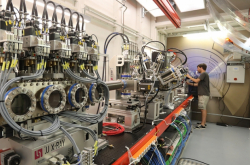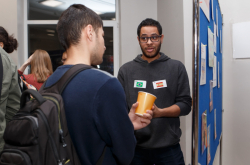"We've decided to support young teams. University science has a great advantage before academic science: we have many young Candidates who want to do research. Our task is to make them stay in science. So, we've set the following requirements: 70% of the research team must be young scientists, master's and research students, and the head must be a young Candidate or Doctor of Science. What is more, for the last years we’ve enjoyed the tendency of research being aimed at solving practical problems, despite its fundamental nature", notes Irina Melchakova, head of ITMO's Office of International Research.
One of these projects was developing metamaterials and metasurfaces for different applications, including MRI. This made it possible to increase the quality of MRI or decrease the time spent on scanning, as well as decrease the energy consumption and even neutralize the overheat of tissues. Another such projectwas developing algorithms and control methods for complex systems under adverse conditions. The scientists believe that their research will be applied in the infrastructure of "smart" cities, unmanned aircrafts and other fields. Among the scientists who got support were also professors Alexander and Vladimir Vinogradovs, who do research in the field of sol-gel chemistry and have created a multipurpose research center from a single laboratory.
 ITMO University. Irina Melchakova
ITMO University. Irina Melchakova
At St. Petersburg Polytechnic University, the new funding — 115 million rubles — will be used for developing technologies in the field of metallurgy, mechanic engineering, development of new materials, power supply, and technical sciences as a whole.
"Financing is really important. Apart from developing our competencies, we can confirm whether the areas we're working in are in-demand by the state. We support highly qualified engineers — as we work with high-technology equipment, we need those who can operate it. As for leading scientists, we support them personally. Part of the projects we chose to finance are important to us as groundwork for what we are planning to present in the future", shares Vitalii Sergeev, Vice Rector for Research at the St. Petersburg Polytechnic University.
According to VitaliiSergeev, when a university decides on its project's priority, it has to define the module the research belongs to from the point of its relevance. At the same time, it is essential to assume which promising applications can be results of its fundamental theory. For instance, to analyze signals from space, scientists need hi-end measuring equipment. This leads to developing technologies that can be used to control ground-borne robots. Then, this becomes a collaborative project with some company, where ground-borne robots are controlled by autonomous signals from the orbit.
 ITMO University. International Research Center for Nanophotonics and Metamaterials
ITMO University. International Research Center for Nanophotonics and Metamaterials
"We develop new drugs for treating oncological diseases, help surgeons localize tumors during surgery, use ultrasound to dissolve indurations and stop hemorrhages. We are interested in our fundamental groundwork finding practical applications", underlines the university's representative.
As Irina Melchakova notes, by the end of 2016 the total volume of contracts, R&D financing, grants and funding from Project 5−100 for ITMO University amounted to about 2 billion rubles. The amount of extrabudgetary funding for St. Petersburg Polytechnic University amounted to 1,5 billion.






